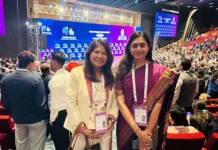ITANAGAR, Mar 13: The Arunachal Pradesh Women’s Welfare Society (APWWS) has said that for the first time in the history of Arunachal Pradesh state budget, priorities have been given to the safety, security and welfare of women and children.
Some of the major proposals of the government are – amendment of IPC in cases pertaining to rape of minors, establishment of women police station, forensic laboratory, enhancement of grant-in-aid of the APSCW, crime against women cell, juvenile home, women helpline and one stop centre, enhancement of quantum of compensation for rape survivor, destitute home , installation of CCTV cameras in the Capital, Dulari Kanya Yojna, CM’s Vidya scheme for girl students, enhancement of widow pension, allocation of money for research, and corpus fund of one crore for the Arunachal Pradesh Victim Compensation Scheme, 2012.
The society further lauded the state government for giving opportunity to the people and organizations of the state with their inputs.
The APWWS said that major suggestions placed before the government by the society have been incorporated in the present budget session.
It also lauded the proposal for building infrastructure for establishment of the State Human Rights Commission, which is one of its major demands.
The society expressed the hope that establishment of an independent State Child Rights Commission and regularisation of the staffs of the APSCW, who have been rendering services for more than a decade, will be actively considered.
The Child Welfare Committee, ICC has also welcomed the decision to amend the legal provisions for rape victims, enhancement of compensation for rape survivors, establishment of forensic laboratory and juvenile home.
State Bharatiya Janata Party (BJP) president, Tapir Gao, congratulated Chief Minister Pema Khandu and Deputy Chief Minister Chowna Mein for another “landmark budget”, which he hoped would bring about all round development in the state.
Hailing the budget presented by the Pema Khandu led government, Gao termed the budget document as testimony to the party and government’s commitment to a bright future, with firm resolve to carry forward the state’s rich tradition and culture.
Citing that the progressive pro poor, pro-people budget is in line with the philosophy of sabka saath, sabka vikash of the BJP, Gao opined that the eight thrust areas of education, skill development, health, governance reform, IT, Infrastructure, social security, agriculture and allied sectors are very important areas that will spur developmental activities and boost economic growth.
“Total budget layout is a new benchmark in Arunachal Pradesh’s history,” said Gao while referring to fund of Rs 19, 261 crores spread across 16 sectors/ subjects as announced by the Deputy CM, who is also the Finance Minister.
Saying that Arunachal Pradesh is primarily an agrarian state where over 80 percent of the people still depend on agriculture for livelihood, Gao opined that focus on agriculture will go a long way in growth of this sector, and augment the livelihood of thousands of farmers.
He also lauded the proposal for creation of Krishi Mitras in each district that would benefit innumerable farmers.
“In order to improve delivery of healthcare of services, creation of robust, transparent and accountable system of procurement of medicines and equipments was important besides recruitment of more doctors and other medical staffs”, he said.
Gao also appreciated the announcement of Rs 10 lakh financial assistance to renal failure patients.
Highlighting that the welfare and security of women is of prime concern of the BJP, Gao said that the budget has proposed several initiatives for women empowerment in line with this philosophy of the party by strengthening the Arunachal Pradesh State Commission for Women and establishment of more women police stations, besides announcement of several incentives for the benefit of women.
He also commended the several provisions in the budget on skill development and entrepreneurship through Chief Minister’s Yuva Kaushal Yojona, which have been designed taking into consideration specific challenges face by the youth.

